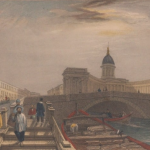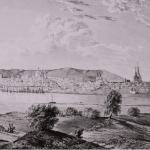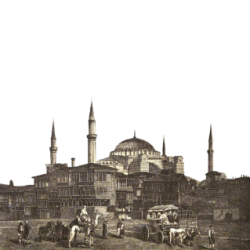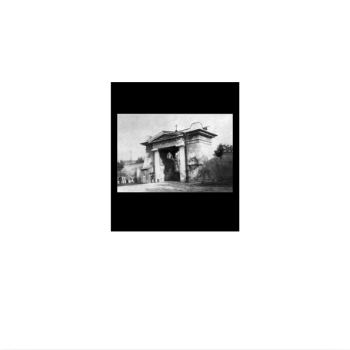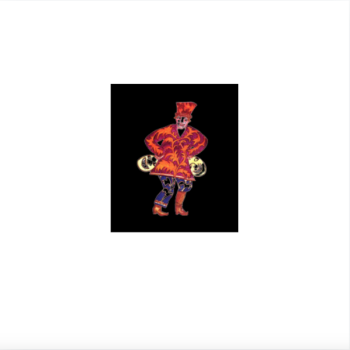LETTER TO NATALYA
Helena Andreevna was with the regiment in the village of Kamenskoye when she learned that her old nanny, Alexandra Andreevna was sick and at the point of death. When she went to see her, she found the poor old woman in a cold hut, under a tattered blanket, suffering in unspeakable pain. Her daughter, whom she lived with, would not send for the doctor (who was 50 miles away.) It was not out of cruelty, it was from the bitter financial situation they were in.[1] Helena Andreevna decided to use the last bit of money she had to send for the doctor. The news was grim. She was dying from cancer. Helena Andreevna wanted to see to the old lady again, that is, if her husband, “Herr Captain,” let her use the horses.
Her mind was weighed down. There was a six-page letter from Natalya that she needed to respond to, but she was thinking of what to write. “Herr Captain” was very angry that a lot of money was being spent on her correspondence, (even though most of her letters were to his relatives.) She also needed to respond to her mother and Katya, or maybe she didn’t. They were both angry that Senkovsky edited out the best parts from “Jellaledin,” and advised her to turn to Nikolai Polevoy. She herself would have liked nothing more than to get rid of Senkovsky, but she gave him her word that she would only submit her works to his journal—and she could not go back on her word. Moreover, no matter how dark his calculations and actions were, she could not forget that he showed her this path. “His treachery does not give me the right to play with words and gratitude,” she thought. “Let him distort it, as long as he doesn’t insert dirt that falls on my pen.”
Natalya’s letter remained unanswered. A fever took hold of Helena Andreevna at the end of December, and it was, to use her words, a personal “Waterloo.”[2] Maybe it was just the fever, but she was feeling particularly depressed and regretted even going to Pyatigorsk, the place where the “coldness” between her and her family began. “I believe that in everyone’s life, there is a crucial time when fate reads a decisive verdict,” she thought with sweat dripping down her face. In the first week of January, Pyotr Alekseevich went to buy horses in Kharkov and took Helena Andreevna with him to see the doctors. She insisted that she was fine. “It will pass,” she said. “I have such a cat’s life that I, like Kashchey the Deathless, do not drown in water and do not burn in fire.” As soon she was torn away from Lelya and Vera, she almost went mad from longing; sitting in a dirty tavern, she desperately missed her girls. Then they went to Chuguev where they paid a visit to Pyotr Alekseevich’s mother, Elizaveta Maksimovna. His family embraced her, of course, but it all seemed so fake. It was not so long ago that they cruelly slandered her. She coldly accepted a “Judah’s kiss.” Then Nikolai Nikolaevich Vasilchikov (Pyotr Alekseevich’s half-brother) came and made Helena Andreevna laugh with tenderness, and even embarrassed her with kisses. She barely knew him and could not boast of family love. He was beautiful in appearance and seemed to be a kind boy. “A pity, really, that his head was a little empty,” she thought, “but it did not matter because he was rich!”
On January 10 she received a gift from Pyotr Alekseevich’s other brother, Jean. It was a birthday present she opened a day early. It was a magnificent edition of all Italian poets. This gift made her incredibly happy. Jean understood her. Jean listened. Helena Andreevna was happy to finish all the correspondence with her family and friends thanking them for their birthday congratulations. “I don’t know anything more stupid than these congratulations!” she thought. “Congratulations for what? The fact that the year is closer to old age, to illness? Death?” The most ridiculous birthday greeting she experienced was from someone who congratulated her on the fact that she was “born in this beautiful vale!” She politely nodded but was fuming inside. “Well,” she thought, “what if I’m not at all happy that I was born?!” She knew her fate was not one of those that changes; it was, to put it in a metaphor, constantly gray in color, without joy, monotonous, solitary, without great grief. She thanked God, for as long as everyone dear to her heart was alive, this was bearable.
There were balls, and masquerades, in Ekaterinoslav; invitations were sent to her almost weekly. But here, there were also gossip and quarrels, too, and she was not a fan of those. She usually just refused on the pretext of either ill health or bad weather. Baron Frank was recently at one of these feasts, and Baroness Frank (Varvara Konstantinovna,) who was now elected provincial leader (in the person of her husband,) loudly announced to Helena Andreevna. “So my darling, you will certainly be at my ball on the twentieth?!” To which Helena Andreevna replied. “I would certainly come during Lent in order to have the happiness of talking with you in your office.” But the baroness had no time for Helena Andreevna at the ball. Yes, these balls had everything there, from the fifty-year-old governor’s wife to the girls, jumping and dancing. “Why should I sit alone in the corner like some man in a sad painting?” she thought.
She continued her studies, and in the evenings she taught Lelya music, afterwards they would chat. When everyone settled down, Helena Andreevna went to the office for a few hours to think—this was her rest, her holiday. They say that they will be transferred to the Oryol Province. Yes, she was tired of the steppes, but it was not as though Oryol would change her life in any meaningful way. No matter where they were, she absolutely won’t get to know anyone. The lower-rank landowners were not for her, and the higher ones looked down on her. “It’s not for me to compete with them,” she thought, “but I’m too proud to bow to a golden caftan.” Helena Andreevna re-read Natalya’s letter. There was an idea in there to which she objected, l’èmancipation de femmes. Natalya had recommended that she study the works of the social philosopher, Henri de Saint-Simon, who, among other things, advocated for female enfranchisement.[3] She wrote back:
The idea that the only happiness possible for a woman will never be her lot; that she should walk along the path of life not amicably, not hand in hand with a friend to whom she gave her soul, faith, all her being, but with a person who took possession only of her body, who possesses her at the whim of her relatives or because of her childhood weakness, which people knew how to take advantage to bind the child in swaddling clothes with indissoluble bonds—this thought kills all the energy in her and turns her into a weak, pitiful creature who, feeling pushed off the straight path, rushes to every bright point, trying to find solace or even a moment of oblivion; but finding nothing in the whole universe, tired, often senseless, ends a useless age, giving it away as capital, which was in vain entrusted to her in the desert of light, where she needed not gold, but a piece of bread, a drop of life-giving water! What is life without this, what constitutes the foundation, beauty and crown of life? I can’t help but write down the remarks of Krivtsov, my Caucasian acquaintance, who amazed me in his letter: “The heart bleeds, looking at similar parties; they remind me of Siberian roads, along which strings of unfortunates stretch, chained hand in hand and strung on one rope!” How fair is that? Several times in Chuguev I could hardly hold back tears of tenderness, and at the same time burning sadness, at the sight of Anyuta’s loving caresses with her husband after 16 years of marriage. Blessed lot![4]
By spring, Helena Andreevna’s illness had become so complicated that it required serious attention. She was sent to Odessa, where a mineral water establishment had just opened. She loved Odessa very much and hoped to find an Englishwoman there to teach the girls English—which was her cherished dream. Weakened by illness, however, and morally upset by many anxieties and sorrows, she soon grew bored there for the first time. She was depressed and sick and did not want to go anywhere. Her acquaintances sought her out and awkwardly besieged her with invitations to salons, not as herself, but as a “writer for show,” which irritated her even more.
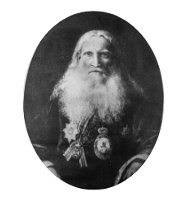
Uspensky c. 1880s.
“Ecoutez! Oh, how glad I am to see you!” said a friend who caught her on the street. “Tomorrow we will have several people over who really want to see you! Especially our relative, Andrei Podolinksy. He had only just returned from St. Petersburg. Osip Ivanovich told him so much about you, and now he really wants to meet you.”[5] In June she wrote to her family:
Dust, wind, heat—that’s all I can tell you about Odessa! I drink disgusting hot water, and every morning I run around the garden alone in the crowds of dressed-up ladies and overdressed gentlemen. After running around until my legs hurt, I sit at home and read, and my head still hurts! Here are my own pleasures of Odessa. I only go out to the boulevard at night, when everyone has left. I can’t express what an unpleasant feeling the crowd gives me! Here I am being pursued by my cauchemar—my authorship. Not since I happened to hear the waters: “Here she is! It’s her!” And then the name of one of my literary children…It’s unpleasant to stop being yourself and become common property and the target of glances. The same thing happened in the Caucasus, but there were more Russians and more goodwill. Here it’s as if they are looking at a crocodile wearing flannel or a dancing monkey.
Helena Andreevna refused the invitation to the dinner and almost lost the opportunity to meet the poet (whom she greatly respected.) Her favorite interlocutor at the time was the archimandrite of Odessa, Porphyrius Uspensky, who was also being treated with mineral waters in the city. He offered Helena Andreevna his sage advice. She was sick, he would say because she worked too much with her brain and “abused her spiritual powers.” He gave whole lectures about the influence of imagination on the body.
One of the most colorful and controversial figures of the Russian hierarchy, and a typical representative of Russia’s educated monastic clergy, Uspensky, was a hot-tempered (some would say arrogant) personality. He had studied at the St. Petersburg Ecclesiastical Academy, where he displayed an intense desire for knowledge. Ever since he was a child, he showed an interest in books and manuscripts, rather than other people. He was particularly fascinated by the Orthodox East and longed to make a scientific trip there one day. Knowing that he could only fulfill his scholastic dreams by becoming an educated monk, he entered a monastery.[6] In the coming years, he would discover, and bring back to Russia, the earliest dated miniscule New Testament manuscript.[7]
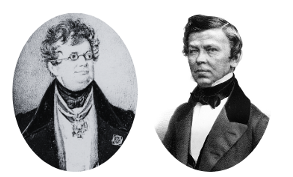
(Left) Kniazhevich (Right) Benediktov.
Despite her temporary unsociability, Helena Andreevna received so much attention from Odessa society, that she had to overcome her gloom and go out quite often. She also received guests, almost all of them uninvited, but, nevertheless, interesting. Her most frequent caller was Dmitry Maksimovich Kniazhevich, a scientist, writer, ethnographer, and trustee of the Odessa District. A bright personality of scientific and social life in the Russian Empire, he brought to her many representatives of science and literature who wished to get to know her.[8]
The day after his first visit, Kniazhevich brought the poet Vladimir Grigoryevich Benediktov, who translated Goethe, Schiller, and Gautier, among others. He was a small man, with gray shiny eyes and brown hair. His nose turned out, and his lips curled up strangely when he spoke. He was like a caricature. The two men spent a long time there, and there was hardly anything topic they did not discuss during their conversation. Helena Andreevna could not get a read on Benediktov’s intelligence, however, he was a shy man, quiet, and not at all dexterous, as though he were afraid to speak.
The next day Helena Andreevna was very busy with the arrival of the English governess she secured, Miss Augusta Sophia Jeffers of Yorkshire. Before dinner, she went for a walk and took a box seat at the opera. When she returned home, she was given Benediktov’s business card. Evidently, he had called when she was out. The following day he called again and apologized for taking up her time. They ended up talking for five hours, and Helena Andreevna was now convinced that he had a positive mind, not witty, but observant and subtle. In fact, she found it impossible not to love him for his love of Russia, and everything Russian. He complained that in St. Petersburg the pompous phrases of French novelists had so accustomed the public’s taste to “false, noisy tones,” that they now did not like Shakespeare nor Schiller! He told funny stories about his artist friend Nikolai Alexandrovich Stepanov, who decorated his entire apartment with very apt caricatures he made of his world of literature and art. He depicted, for example, a cartoon in which the grammarian Nikolay Gretsch as a statue with his hands folded in “Napoleonic fashion,” standing on a pedestal of his own grammar. Under his coat, the editor, Nikolai Polevoy, was depicted as a dog rushing to bite Senkovsky.
Helena Andreevna solicited his critique for her work, trusting that he would give serious comments and not just compliments. Benediktov insisted that he knew little about modern fiction, having read only a few stories.
“I am a poet and a poet at heart,” he insisted. “Let journalists sort things out by their composition. I just read, enjoying your work as a whole—your strong style, the charming femininity of your heroines, the fullness of characters, and the picturesque scenes of nature you describe. Yes, I read, and then I mentally thank the author for an hour of pleasure, and I don’t poison them with petty analysis.”
The following day, June 29, Benediktov came to say goodbye to Helena Andreevna. He brought her his works and went straight away to his ship that was leaving for the Caucasus. Not long after he left, she was delighted to find a poem he had written for her on the title page of one of the books which read:
HELENA HAHN
From my early years,
fate showed me a
Sad, difficult path of life,
I bequeathed a cup of sorrow to drink in secret,
And a higher power protected me for a long time
With silence and a strong chest.
I did not express my sadness,
I hid my heart from people.
With their mercy, they tormented,
They frightened them with their affection!
But the shelter of the closed feelings became too small,
And wild in the wilderness.
They were tearing apart the chest!
The sounds of timid songs
Accidentally escaped from the tremulous soul.
All that fate allowed me to know and feel
Is a deceptive delight, and bitter love, both
Joy and sadness, I shed everything in my heart
And my heart became empty again!
Here are a few pages
These are the wretched sheets
Where did I introduce the measured boundaries
Souls of cherished traits
Here are the living delusions of quick youth
Golden dreams of life,
And hearts of vain excitement
Whatever I am rich with, whatever I am poor with!
Accept everything: my dreams and tears!
The primacy of my essays and feelings and thoughts,
Where in front of the pose of your magical prose,
Damn, every verse goes out![9]
-
- NOVOROSSIYA
- The Arbiter Of Europe’s Destiny.
- The House Dolgorukuy
- Madame Krüdener
- Ekaterinoslav
- The Arabat Arrow
- The Mystery Of General Inzov
- The Doukhobors
- Pushkin
- Chuguev Military Settlement
- “The Blessed”
- The Decembrists
- Penza
- Independence
- Last Words Of Samuel Khristianovich Kontenius
- “Amid Coffins And Desolation”
- Rusalka
- Dead Souls
- Secret Passages
- Astrakhan
- Nevsky Prospekt
- Kalmyk Ulus
- Love And Ambition
- Duellistes
- Pyatigorsk
- A Heroine Of Our Time
- Winter Palace
- Zeneida R-Va
- Steppes
- Letter To Natalya
- Fire And Ice
SOURCES:
[1] [“Letter From E. A. Hahn To Natalya P. Dated January 10, 1839. [Kamenskoye Village, Ekaterinoslav Province.]” [Preparation of the text and comments by A.D. Tyurikov. Bahmut Roerich Center. Originally published in: Gershenzon, M.O. “Russian Woman Of The ‘30s.” Russian Thought. Vol. XII, C. 55 (December 1911.)]
[2] [“Letter From E. A. Hahn To Natalya P. Dated January 10, 1839. [Kamenskoye Village, Ekaterinoslav Province.]” [Preparation of the text and comments by A.D. Tyurikov. Bahmut Roerich Center. Originally published in: Gershenzon, M.O. “Russian Woman Of The ‘30s.” Russian Thought. Vol. XII, C. 55 (December 1911.)]
[3] Saint-Simon stated: “The law of human progress guides and dominates all. Men are only its instruments. Although this force derives from us, we can no more submit its movement to our influence…than change at our whim the primitive force which impels our planet about the sun…All we can do is consciously obey this law…ascertaining the course which it marks out for us, instead of being blindly pushed by it.” Lyon, Peyton V. “Saint-Simon and the Origins of Scientism and Historicism.” The Canadian Journal Of Economics And Political Science / Revue Canadienne d’Economique et de Science Politique. Vol. XXVII, No. 1 (1961): 55–63.
[4] “[You want] women achieve equality with men—and you persecute the latter for oppressing our sex? You are not right! I am also a woman, I suffer a lot from the conditions that entangle our sex, but I will never agree with the opinion that a woman is placed by nature on an equal level with a man. Our souls are weaker, like our bodies, our minds are more petty, and our very destiny is too clearly indicated by nature. I believe that in composing all systems and opinions one must look back to past centuries; back to the time of old Chrysostom who, better than all the prophets, could predict the future, because humanity does not change. The education of peoples rises and falls, the spirit of nations, under the influence of religions and political relations, tenses or weakens, but a person always remains a person; people are atoms; by composing them into mosaics, one can give the whole the coarsest or the most delicate shades, but the essence or matter of the atom does not change; and therefore it is worth looking at the past and asking: Why in no century have we ever seen a woman Socrates, Lycurgus, Confucius, or a woman Raphael, Michealangelo, Dante, Shakespeare, or Schillers? Where are the women Beethovens or Webers? Does this not prove our insignificance in all respects? You will object, saying that the difference in the upbringing of a man and a woman has an impact on their entire lives—but does true genius require education in order to manifest itself? I don’t say develop and improve—haven’t we seen geniuses who, overcoming the insignificance of birth and means , without any outside help, open up the path to glory for themselves? Of course, a man’s position and freedom in the world greatly contribute to his rise, but I will never agree that the conditions that oppressed our sex for so many millennia killed all geniuses in the bud. The purpose of a woman is beautiful, noble, if it is not distorted at the beginning. Be a Penate, a guardian angel and comforter of a man, prepare for him joy and tranquility under his native roof after his noisy career, be the mother of his children, develop in his sons the strength and fortitude of spirit, the nobility of concepts, to prepare his daughters to be worthy friends and mothers. Is a woman who has fulfilled this destiny not worthy of incense? Doesn’t she leave behind a fame that is not so loud, invisible, but no less useful, like a man with the highest head? But for this, one should not take away from her the only good, one reward—freedom in choosing the one to whom she brings her whole life as a gift. She can do a lot if her feelings agree with her duty, but nothing against her will. The idea that the only happiness possible for a woman will never be her lot; that she should walk along the path of life not amicably, not hand in hand with a friend to whom she gave her soul, faith, all her being, but with a person who took possession only of her body, who possesses her at the whim of her relatives or because of her childhood weakness, which people knew how to take advantage to bind the child in swaddling clothes with indissoluble bonds—this thought kills all the energy in her and turns her into a weak, pitiful creature who, feeling pushed off the straight path, rushes to every bright point, trying to find solace or even a moment of oblivion; but finding nothing in the whole universe, tired, often senseless, ends a useless age, giving it away as capital, which was in vain entrusted to her in the desert of light, where she needed not gold, but a piece of bread, a drop of life-giving water! What is life without this, what constitutes the foundation, beauty and crown of life? I can’t help but write down the remarks of Krivtsov, my Caucasian acquaintance, who amazed me in his letter: ‘The heart bleeds, looking at similar parties; they remind me of Siberian roads, along which strings of unfortunates stretch, chained hand in hand and strung on one rope!’ How fair is that? Several times in Chuguev I could hardly hold back tears of tenderness, and at the same time burning sadness, at the sight of Anyuta’s loving caresses with her husband after 16 years of marriage. Blessed lot!” [“Letter From E. A. Hahn To Natalya P. Dated January 10, 1839. [Kamenskoye Village, Ekaterinoslav Province.]” [Preparation of the text and comments by A.D. Tyurikov. Bahmut Roerich Center. Originally published in: Gershenzon, M.O. “Russian Woman Of The ‘30s.” Russian Thought. Vol. XII, C. 55 (December 1911.)]
[5] Osip Ivanovich Senkovsky was a literary tutor to Helena Andreevna. In a letter dated December 3, 1842, Senkovskyy writes: “She was my literary apprentice, and I can in all fairness take pride in such an apprentice: her striking talent developed, as it were, in my hands.” [Stroganova, Evgeniia. “The Writing Experience As Emotional Trauma: The Case Of Elena Andreevna Gan.” in (eds.) Rytkönen, Marja; Kurkijärvi, Kirsi; Chowaniee, Urszula; Phillips, Ursula. Mapping Experience In Polish And Russian Women’s Writing. Cambridge Scholars Publishing. Newcastle upon Tyne, England. (2010): 50-63.]
[6] Stavrou, Theofanis George. “Russian Interest In The Levant 1843-1848: Porfirii Uspenskii And Establishment Of The First Russian Ecclesiastical Mission In Jerusalem.” Middle East Journal. Vol. XVII, No. 1/2 (1963): 91–103.
[7] Metzger, Bruce M. Manuscripts Of The Greek Bible: An Introduction To Greek Palaeography. Oxford University Press. Oxford, England. (1981): 102.
[8] Deli, A. “Activities Of Dmitry Maksimovich Kniazhevich In Society Of Agriculture Of The Southern Russia.” Записки історичного факультету. [Notes From The Faculty Of History.] No. 27 (2016): 415-426.
[9] Zhelikhovskaya, Vera Petrovna. “Helena Andreyevna Hahn (1835-1842.)” Russkaia Starina. Vol. LII, No. 3 (March 1887): 733-766.


